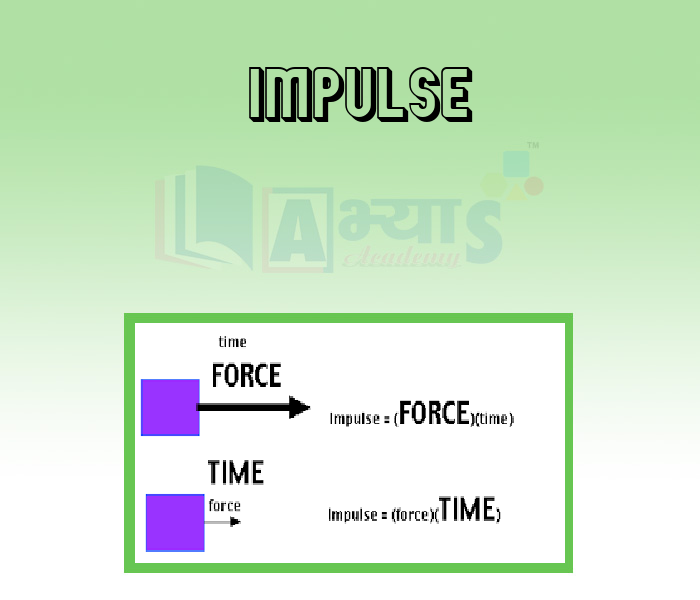Impulse












Impulse
It is termed as the total impact of force. This is equal to the change in momentum of the body. In other words, impulse is defined as the product of force and a small time in which the force acts.
SI unit of Impulse if N s (Newton Second) or kgm/s.
Impulse Equation:
Impulse is often stated to be the product of the average net force that acts on an object for a ceratin duration.The equation for impulse is given as;
Note : We assume that force is constant over time.
Impulse is a vector quantity like force and it also has direction.
Impulse - Momentum Theorem
The Impulse-Momentum theorem helps us establish the relation between the two concepts. The theorem basically states that the change that is seen in the momentum of an object is equivalent to the amount of impulse exerted on it.
Basically, you should understand that impulse is a measure of how much the momentum changes. Here we also get an alternative formula which is given as;
Where initial momentum,
final momentum
With this formula,we can further clearly relate impulse to the chnges in the momentum of the object.
Q.A 650 - kilogram rocket is to be speed up from 440 meters per second to 520 meters per second in outer space. If the thrust of the engine is 1200 newtons, for how long must the engine be fired?
Solution: The change in the momentum of the rocket
= (650)(520) - (650)(440) = 52000 kg m/s.
This must be equal to the impulse, so = (1200N)(t) = 52000 kg m/s
Therefore , = 43 s
The velocity of a car of mass 3000 kg is changed from 18km/hr by applying a constant force . The impluse of the constant force acts. | |||
| Right Option : A | |||
| View Explanation | |||
A hammer weighing 3 kg, moving with a velocity of 10 m/s, strikes against the head of a spike and drives it into a block of wood. If the hammer comes to rest in 0.025 s, the impulse associated with the ball will be __________________ | |||
| Right Option : B | |||
| View Explanation | |||
The direction of impulse is | |||
| Right Option : A | |||
| View Explanation | |||
Students / Parents Reviews [10]
Being a parent, I saw my daughter improvement in her studies by seeing a good result in all day to day compititive exam TMO, NSO, IEO etc and as well as studies. I have got a fruitful result from my daughter.

Prisha Gupta
8thOne of the best institutes to develope a child interest in studies.Provides SST and English knowledge also unlike other institutes. Teachers are co operative and friendly online tests andPPT develope practical knowledge also.

Aman Kumar Shrivastava
10thAbhyas is a complete education Institute. Here extreme care is taken by teacher with the help of regular exam. Extra classes also conducted by the institute, if the student is weak.

Om Umang
10thIt has a great methodology. Students here can get analysis to their test quickly.We can learn easily through PPTs and the testing methods are good. We know that where we have to practice

Barkha Arora
10thMy experience with Abhyas is very good. I have learnt many things here like vedic maths and reasoning also. Teachers here first take our doubts and then there are assignments to verify our weak points.

Shivam Rana
7thIt was good as the experience because as we had come here we had been improved in a such envirnment created here.Extra is taught which is beneficial for future.

Eshan Arora
8thMy experience with Abhyas academy is very good. I did not think that my every subject coming here will be so strong. The main thing is that the online tests had made me learn here more things.

Hiya Gupta
8thAbout Abhyas metholodology the teachers are very nice and hardworking toward students.The Centre Head Mrs Anu Sethi is also a brilliant teacher.Abhyas has taught me how to overcome problems and has always taken my doubts and suppoeted me.

Shreya Shrivastava
8thIt was a good experience with Abhyas Academy. I even faced problems in starting but slowly and steadily overcomed. Especially reasoning classes helped me a lot.

Cheshta
10thI have spent a wonderful time in Abhyas academy. It has made my reasoning more apt, English more stronger and Maths an interesting subject for me. It has given me a habbit of self studying
